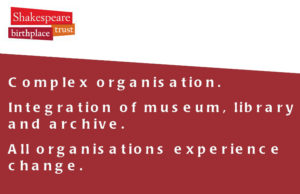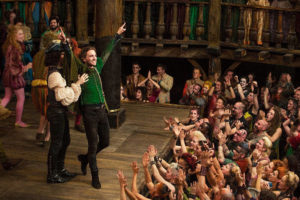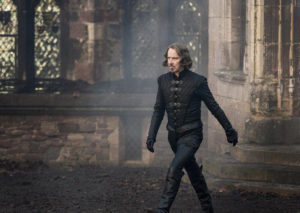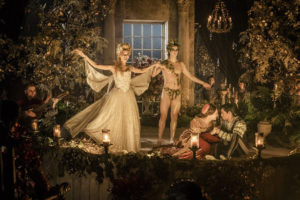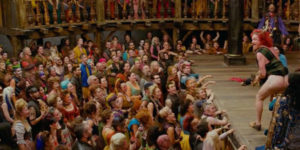James Norwood
WHERE THERE’S A WILL, THERE’S A WAY! Will Shakeshaft dreams of a glorious life in the public theater of London, but, as portrayed in this series, his biggest challenge is coming up with ideas for plays.
In Stratford-upon-Avon, the youthful writer Will Shakeshaft walks out on his family, leaving his wife Anne and their three children in the care of his father. Will has his sights set on London where he will doggedly pursue his fortune as an aspiring playwright. After recounting the racy legend of Queen Mab to his young son, whom he addresses as “Prince Hamnet,” Will leaves town with a completed play in his hip pocket and as the biggest deadbeat dad in provincial Tudor England.
Such is the beginning of the ten-part series Will that aired on the TNT cable network in the summer of 2017. Clearly inspired by the popular film Shakespeare in Love, the creators of Will seek to dramatize how, in a historical epoch with minimal room for social mobility, a social climber with limited educational background could have enthralled audiences in London with the timeless and multifaceted canon of the Shakespearean plays. To view this series is to understand precisely why the received biography of Shakespeare is fatally dissociated from the aristocratic tenor of the plays and the classical subject matter that infuses Shakespeare’s magisterial works.
In an interview for The New York Times, Sarah Aubrey, TNT’s executive vice president of original programming, indicated that she read the pilot script of Will and instantly felt a connection with the project’s “conceit,” which she describes as “the classic story of a young man coming to a big city with nothing but his talent and moxie.”1 In other words, Aubrey was invoking the core foundation of all conventional Shakespeare biographies: the Horatio Alger myth.
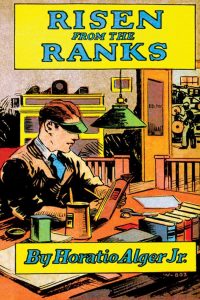 WILL SHAKESHAFT AND THE HORATIO ALGER MYTH: On the surface, the life of author and celebrity Mark Twain seemed to embody the theme of the “rags-to-riches” dime novels of the nineteenth-century American writer Horatio Alger. But despite his humble origins, Twain had utter contempt for Alger’s excessive moralizing and the smarmy success stories. Twain observed the same disingenuous approach of the conventional biographers to the life of Shakespeare, and he expressed his views with wit and wisdom in his final book publication, Is Shakespeare Dead?
WILL SHAKESHAFT AND THE HORATIO ALGER MYTH: On the surface, the life of author and celebrity Mark Twain seemed to embody the theme of the “rags-to-riches” dime novels of the nineteenth-century American writer Horatio Alger. But despite his humble origins, Twain had utter contempt for Alger’s excessive moralizing and the smarmy success stories. Twain observed the same disingenuous approach of the conventional biographers to the life of Shakespeare, and he expressed his views with wit and wisdom in his final book publication, Is Shakespeare Dead?
Of course, the Horatio Alger myth is the default mode dialed up in all orthodox biographies of Shakespeare. But does the Horatio Alger “conceit” ring true over the course of the ten programs of Will? And does it shed light on Shakespeare’s creative process in writing for the theater, based on the sketchy traditional biography that informs the teleplay?
WHAT’S IN A NAME? Since 1847, “The Shakespeare Birthplace Trust” has functioned as a politburo for promoting the Shakespeare legend to thousands of pilgrims, who are led to a provincial backwater and invited to enter a rabbit hole of fantasy. The lazy journalists, who fail to study the evidence of Shakespeare authorship, rely on a limited number of “experts.” And the “go-to” place for expert commentary from the apologists is the most trusted name in Shakespeare propaganda, The Shakespeare Birthplace Trust, which ironically claims to practice the motto “All organisations experience change.”
Paul Edmondson, the head of research for the Shakespeare Birthplace Trust, had a positive response to Will, as he praised the series in the following terms:
“We’ve got an opportunist and we’ve got somebody who for a modern age is charting a rise to celebrity. And this is very empowering. Will’s having to use very much all of his wit to produce this stuff. He’s not a natural genius, which I quite admire the program for showing.”2
In his convoluted synopsis, Edmonson unwittingly reveals a critical problem with the traditional biography of Shakespeare. Contrary to all appearances from the plays and the poems, the Stratford man was not a “natural genius” because the facts of his life run contrary to what should be at the core of an educated, aristocratic genius in Elizabethan England. And like so many other Renaissance artists, Shakespeare was arguably not writing for money or celebrity, but out of the depths of his soul, a truth that is lost on the producers of Will. The essence of artistic genius is so twisted in this series that the viewer loses touch with the actual period in which the story is set and with the principal question of how this author wrote an incandescent body of literature. At least Edmonson is accurate on one point when he alludes to a primary source from one of the contemporaries of William of Stratford, who was described as follows: “He was a natural wit.”3
“AUTHOR! AUTHOR!” The creators of Will believe that playwrights in the Elizabethan public theaters were well known to audiences and received ovations at the ends of the performances. But the evidence suggests that Elizabethan theatergoers attended plays for the subject matter with the author not figuring as the marquee attraction, much like the unsung role played by screenwriters in popular films today.
And where actually did the natural wit’s talent come from, as depicted in the TNT series?
Throughout the ten episodes, Will is vigilantly listening for catchy phrases on the streets of London that he may pilfer for use in his plays. Those members of the public theater audience that constitute the groundlings somehow come up with turns of the phrase like “the milk of human kindness,” “love is madness,” “you must be cruel to be kind,” and, from one of his fellow actors, “strutted his hour upon the stage.” The quick-thinking wit scribbles down the phrases, recognizing instantly that he can use these words in his plays! For the screenwriters, the great wellspring of Shakespeare’s language came not from the author’s erudition and love of wordplay, but from a scavenger hunt for epigrams spoken by others.
A pattern that emerges in the series is the depiction of the protagonist struggling to come up with ideas for plays. After penning a clunker that the theater company refuses to produce, Will seeks the advice of young Alice Burbage, the fictionalized daughter of theater proprietor James Burbage. Alice suggests that Will ought to read books that might provide the springboard for his stories. She then leads the impoverished Will by the hand to the London bookstalls, where she steals a volume that contains an Italian romance that will be the basis for the play The Two Gentlemen of Verona.
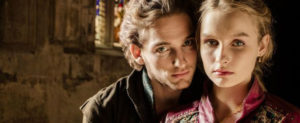 STAR-CROSSED LOVERS OF THE TAWDRY VARIETY: WILL SHAKESHAFT (LAURIE DAVIDSON) AND ALICE BURBAGE (OLIVIA DEJONGE). After starting an affair with the boss’s daughter, Will breaks Alice’s heart when she learns that he is married and has sired three little ones. In his scripting of this real-life drama, Will neglected to provide Alice with the basic exposition to his life story. As a result, he feels like a cad and dashes off a sonnet with the opening line, “When, in disgrace with fortune and men’s eyes.”
STAR-CROSSED LOVERS OF THE TAWDRY VARIETY: WILL SHAKESHAFT (LAURIE DAVIDSON) AND ALICE BURBAGE (OLIVIA DEJONGE). After starting an affair with the boss’s daughter, Will breaks Alice’s heart when she learns that he is married and has sired three little ones. In his scripting of this real-life drama, Will neglected to provide Alice with the basic exposition to his life story. As a result, he feels like a cad and dashes off a sonnet with the opening line, “When, in disgrace with fortune and men’s eyes.”
In another instance where our hero is suffering from “writer’s block,” actor Richard Burbage effortlessly pulls a copy of the English historical chronicle of Raphael Holinshed from his lodging and hands it to Will with the suggestion that he write a series of plays on Henry VI. The program does not make clear how such an expensive, limited edition volume as Holinshed’s Chronicles would be floating around in a low-rent rooming house of Elizabethan London. At a defining moment in the series, Will’s friend Kit Marlowe asks his fellow writer about his next project. But Will shrugs his shoulders, clueless as always for ideas for his plays.
Having exhausted their options to portray any natural gifts of the literary genius of Shakespeare, the filmmakers resort to a subplot that virtually takes over the miniseries and relegates Will Shakeshaft to a supernumerary in the series. The focus shifts to the historical figure of Robert Southwell, a Jesuit priest and the author of poems and political pamphlets that sought to promote a Catholic revival in England. In Will, Southwell serves as personal confessor to Alice Burbage and playwright Kit Marlowe, as well as Will Shakeshaft himself. But there is nothing in the historical record to suggest that Southwell was intent on saving the souls of members of the theater community of London. To the contrary, he was primarily ministering to the elites, who offered him sanctuary in secret hiding places in their homes. Starting in 1586, Southwell was successful in moving around to various safe houses with Father Garnet, but Francis Walsingham’s spy agency caught up with him, and he was arrested in 1592.
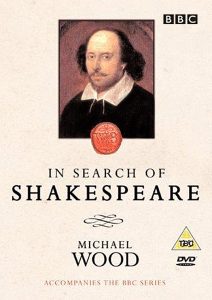 A FOOL’S ERRAND. In Michael Wood’s documentary series In Search of Shakespeare, the filmmaker seemed to be perpetually trudging with his backpack along the road from Stratford to London and back again, looking for clues for the real Shakespeare. But Wood came up empty in finding any convincing biographical connections to add to what was already set forth in the earliest, fanciful accounts of the man from Stratford.
A FOOL’S ERRAND. In Michael Wood’s documentary series In Search of Shakespeare, the filmmaker seemed to be perpetually trudging with his backpack along the road from Stratford to London and back again, looking for clues for the real Shakespeare. But Wood came up empty in finding any convincing biographical connections to add to what was already set forth in the earliest, fanciful accounts of the man from Stratford.
Writer and filmmaker Michael Wood argued for the existence of familial ties between Southwell and William Shakspere of Stratford, by tracing the genealogy of the Arden clan. In his book In Search of Shakespeare (2003), written in conjunction with his television series, Wood cites a letter written by Southwell with the heading, “To My Worthy Good Cosen [i.e, Cousin] Master W.S.”4 In the printing history of the document, the initials W.S. first appeared in the edition of the letter brought out in 1616, the precise time of the death of the man from Stratford. But the letter was originally composed prior to the arrest and torture of Southwell in 1592 and did not include the letters W.S. at that time.
Based on the letter, Southwell recognized no later than 1592, that the author “W.S.” was a far superior poet to Southwell himself. But in the orthodox Shakespearean biography, the Stratford man would have only been starting his writing career at this time. As a novice, how could his authorial prowess have been acknowledged at this early date by Southwell?
 ROBERT SOUTHWELL (c. 1561-95) was linked closely to aristocratic households, not to the London theater community, as depicted in Will. The filmmakers never stop to consider that the author “William Shakespeare” was likewise writing principally for the aristocracy, not for the common rabble of the public theaters, as portrayed in Will.
ROBERT SOUTHWELL (c. 1561-95) was linked closely to aristocratic households, not to the London theater community, as depicted in Will. The filmmakers never stop to consider that the author “William Shakespeare” was likewise writing principally for the aristocracy, not for the common rabble of the public theaters, as portrayed in Will.
Southwell himself knew through experience the vital importance of using a pseudonym; none of his writings were published under his name. Yet, the evidence suggests that by 1592, the author “Shakespeare” knew the writings of Southwell, and Southwell was similarly familiar with the poetry of “Shakespeare,” specifically, the content of the narrative poem “Venus and Adonis,” which would not be published until 1593.
In a prefatory address attached to his poem “Saint Peter’s Complaint,” written shortly before his arrest in 1592, Southwell wrote that “the finest wits are stilling Venus’ rose…playing with pagan toys.”5 The “pagan toys” allusion is likely a nod to Ovid’s Metamorphoses that was both the basis for “Venus and Adonis” and the favorite classical resource used in Shakespeare’s plays. Wood even raises the possibility that Southwell might have read “Venus and Adonis” in draft form while residing in the home of the Earl of Southampton.6 A close examination of Southwell’s family tree indicates that Southwell was indeed a relative of the Earl of Southampton. As observed by Wood, “Southwell had Hampshire family connections, too, and his track as a hunted man naturally led to the Southamptons at Tichfield.”7
RICHARD TOPCLIFFE (1531-1604), the sadistic Catholic hunter and torturer, is held up for ridicule when Will seeks to equate him with the villain Richard III. But to do so, Will has to invite Topcliffe to the theater, seat him on the stage, then have the actors point at him during the performance, in order for the audience get the idea of the satire. The author Shakespeare undoubtedly learned about satire from studying the Latin authors Horace and Juvenal. In Will, the untutored playwright gets the idea of satire from a grimy, little street urchin and boy actor named Presto.
Wood’s deep-seated belief in the theory of Southampton as Shakespeare’s patron clouds his vision, as he refuses to consider the possibility that the author of “Venus and Adonis” had adopted the name of William Shakespeare (W.S.) as a pseudonym. Here is but one of the numerous instances where on the surface, it appears as though documentary evidence related to a figure like Southwell may have a bearing on William Shakspere of Stratford, but, on a deeper level, the paper trail leads back to the tightly-knit circle of the Earl of Oxford.
THE HIGHLIGHT OF THE SERIES: A Midsummer Night’s Dream is recreated for the occasion of a betrothal at an Elizabethan manor house.
The best scene in the ten episodes of Will is the staging of a Shakespearean play in an aristocratic setting apart from the London theaters. This comes in Episode #7, where Shakespeare’s comedy A Midsummer Night’s Dream is written for and performed in an aristocratic household. The mise-en-scène and the intimate connection with the elitist audience had the genuine look and feel of a play by Shakespeare. Even the moment when Will speaks the epilogue, breaking the fourth wall to address the aristocratic couple, seemed convincing. Whereas the numerous scenes in the large-scale public playhouse seemed forced and artificial, often resembling a modern rock concert, the staging of A Midsummer Dream in an intimate, aristocratic space appeared lifelike and perfectly in sync with the rhythms of Shakespeare’s play. Here the screenwriters had apparently conducted a limited amount of research to learn that the earliest recorded performance of this play occurred as part of the festivities surrounding an Elizabethan aristocratic wedding, specifically that of Sir Thomas Heneage and the widow Countess of Southampton on May 2, 1594, at Copped Hall, or possibly the wedding of Elizabeth de Vere to the Earl of Derby on January 26, 1595. Once again, the careful research into the history of a Shakespearean text leads back to the coterie of the Earl of Oxford.
DONE IN BY THE RATINGS! With little fanfare, TNT announced the cancellation of Will the day after the airing of the concluding episode.
The season finale of Will occurred on September 4; on the following day, the show was cancelled by TNT. The ratings were extremely low throughout the ten-week run, averaging only 392,000 viewers per week. The premiere on July 10 drew the largest audience of 633,000. For purposes of comparison with other programs around this time, the opening episode of the seventh season of HBO’s Game of Thrones drew 16.1 million viewers, and the televised parole hearing of O. J. Simpson drew 14 million. By the middle of the series, the TNT executives were clearly in the punt mode when they shifted the program from prime time to the hour of 11:00 pm Eastern. Over the course of the ten episodes, Will was in a steady free fall with the final episode attracting an audience of only 307,000.8 Interested viewers may currently stream the series from a range of venues.
PANDERING TO THE GROUNDLINGS: The film artists offered a colorful recreation of the public theaters of London in the Elizabethan age. But they missed the point that the London audiences had to be adept listeners during the performance, as opposed to a raucous rabble responding to a moon shot.
The making of Will involved the collaboration of a number of talented film artists. The series creator, Craig Pearce, has served in a longstanding capacity as a writer for filmmaker Baz Luhrmann. Pearce adapted Shakespeare’s play for the 1996 film Romeo + Juliet, starring Leonardo DiCaprio and Claire Danes. Four of the episodes were directed by Shekhar Kapur, who has brought to the screen the visually stunning Elizabeth films, starring Cate Blanchett. The acting company was led by two winsome performers, Laurie Davidson as Will and Olivia DeJonge as Alice.
Unfortunately, the able cast and technical team could not salvage an inherently flawed concept and a teleplay that, over ten hours, offered a portrait of Shakespeare that was the rough equivalent in the film medium of the Droeshout engraving in the visual arts. In an interview with The New York Times, the series creator Pearce is described as one who “firmly believes that Shakespeare wrote the plays attributed to him. Any contrary theory ‘is just bonkers,’ he said.”9 With tunnel vision for the orthodox Shakespeare biography, Pearce places himself in the unenviable position of trying to fit a square peg into a round hole in depicting the life story of one of the greatest authors in world literature. The Shakespeare that is presented in this series is one who succeeds through the sheer force of “Will Power.” But the soaring spirit of the author’s creative genius is never brought to life.
GOOD NIGHT, SWEET WILL! Parting is such sweet sorrow. Alas, your series was much ado about nothing, and it was not brought back for a second season curtain call.10
James Norwood, Ph.D., taught humanities and the performing arts for twenty-six years at the University of Minnesota. For a decade, he taught a semester course on the Shakespeare authorship question. He wrote the foreword to the paperback edition of Charles Beauclerk’s Shakespeare’s Lost Kingdom, served as a consultant for the documentary film Last Will. & Testament, and is the author of “Mark Twain and ‘Shake-Speare’: Soul Mates,” which appears on the Shakespeare Oxford Fellowship website.
NOTES
- Alexis Soloski, “ ‘Will’ on TNT: A Punk-Rock Shakespeare, Striving and Stage-Diving in the Big City,” The New York Times(June 28, 1017): https://www.nytimes.com/2017/ 06/28/arts/television/will- shakespeare-tnt-still-star- crossed.html?mcubz=0
- Melanie McFarland, “Fact or Fiction? A Shakespeare Expert Takes on TNT’s ‘Will’” Salon, July 17, 2017 http://www.salon.com/2017/07/ 17/fact-or-fiction-a- shakespeare-expert-takes-on- tnts-will/
- Eric Sams, The Real Shakespeare: Retrieving the Early Years, 1564-94 (New Haven, CT: Yale University Press, 1997), 202, n. 83.
- Michael Wood, In Search of Shakespeare (BBC Books: 2003), 154.
- Richard Wilson, Secret Shakespeare: Studies in Theatre, Religion and Resistance (Manchester: Manchester University Press, 2004), 126.
- Wood, 153.
- Wood, 151.
- “TV Series Finale—Cancelled & Renewed TV Shows”: https://tvseriesfinale.com/tv- show/will-season-one-ratings/
- Soloski.
- Pictorial credits:
Poster: https://tvseriesfinale.com/wp- content/uploads/2017/07/will- tnt-season-1-ratings-canceled- or-season-2-renewal-590×224. jpg;
Risen from the Ranks: https://i.pinimg.com/736x/65/ 8d/09/ 658d093724764cc625fbfc5fa1206c 04–comic-book.jpg;
Shakespeare Birthplace Trust: http://www.balettie.com/ zenphoto/cache/vacation- photos/england-2015/27may15- stratford-upon-avon- shakespeare-properties/ shakespeare-birthplace-trust- flag_1200.jpg
Will’s curtain call: https://cdn.vox-cdn.com/ thumbor/X7QLBMvzfyT- 3W7x2n0p7qOWGvA=/0x0:1500×844/ 1200×800/filters:focal( 255×143:495×383)/cdn.vox-cdn. com/uploads/chorus_image/ image/55609297/gallery_19_ 1600×900.0.jpg
Will and Alice: http://hollywood-spy.blogspot.com/2017/07/premium-spotlight-on-super-dynamic-will.html
Michael Wood: http://media1.takealot.com/ takealot/covers/1978104/cover- zoom.jpg?1327539530
Southwell: http://www.azquotes.com/author/23929-Robert_Southwell
Topcliffe: http://trackingboard1. wpengine.netdna-cdn.com/wp- content/uploads/2017/08/will- ep-9-4-1024×727.jpg
A Midsummer Night’s Dream: https://i1.wp.com/www. telltaletv.com/wp-content/ uploads/2017/08/26058_013_ 0584_R.jpg?resize=1170%2C780
I.P.: http://clipart-library.com/ clipart/36963.htm
The Groundlings: https://media.pitchfork.com/ photos/ 596f8fad341eab5d78800930/ master/w_790/shakespeare-punk- 790.jpg
Onstage at The Theater: https://static01.nyt.com/ images/2017/07/02/arts/ 02SHAKESPEAREJP1/ 02SHAKESPEAREJP1-master675.jpg


